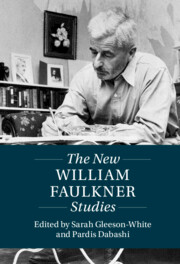Book contents
- The New William Faulkner Studies
- Twenty-First-Century Critical Revisions
- The New William Faulkner Studies
- Copyright page
- Contents
- Notes on Contributors
- Introduction
- Part I Approaches
- Part II Cultures
- Chapter 7 Queering Faulkner: Content, Structure, Failure
- Chapter 8 Faulkner and Women
- Chapter 9 “A Shape to Fill a Lack”: Faulkner and Indigenous Studies
- Chapter 10 On Thingification: Faulkner and Afropessimism
- Part III Interfaces
- Index
Chapter 9 - “A Shape to Fill a Lack”: Faulkner and Indigenous Studies
from Part II - Cultures
Published online by Cambridge University Press: 23 June 2022
- The New William Faulkner Studies
- Twenty-First-Century Critical Revisions
- The New William Faulkner Studies
- Copyright page
- Contents
- Notes on Contributors
- Introduction
- Part I Approaches
- Part II Cultures
- Chapter 7 Queering Faulkner: Content, Structure, Failure
- Chapter 8 Faulkner and Women
- Chapter 9 “A Shape to Fill a Lack”: Faulkner and Indigenous Studies
- Chapter 10 On Thingification: Faulkner and Afropessimism
- Part III Interfaces
- Index
Summary
For reasons that are not mysterious, Indigenous studies has had little to say about William Faulkner. Though some of Faulkner’s most memorable characters and lasting fictions speak to topics of great concern to Indigenous studies – settler violence; land claims; intergenerational continuities and disruptions; and the entanglements of race, lineage, and power by way of blood, to name but four – Faulkner rarely centers on Indigenous people in his fictions, let alone writes them into the kinds of complex, densely textured existence he confers on non-Native characters.
- Type
- Chapter
- Information
- The New William Faulkner Studies , pp. 151 - 165Publisher: Cambridge University PressPrint publication year: 2022

